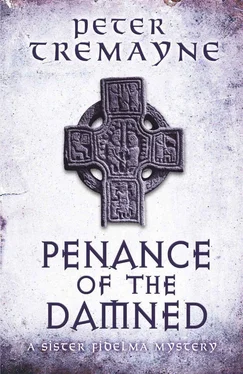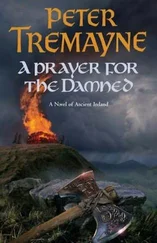Peter Tremayne - Penance of the Damned
Здесь есть возможность читать онлайн «Peter Tremayne - Penance of the Damned» весь текст электронной книги совершенно бесплатно (целиком полную версию без сокращений). В некоторых случаях можно слушать аудио, скачать через торрент в формате fb2 и присутствует краткое содержание. Год выпуска: 2016, Издательство: Headline, Жанр: Исторический детектив, на английском языке. Описание произведения, (предисловие) а так же отзывы посетителей доступны на портале библиотеки ЛибКат.
- Название:Penance of the Damned
- Автор:
- Издательство:Headline
- Жанр:
- Год:2016
- ISBN:нет данных
- Рейтинг книги:5 / 5. Голосов: 1
-
Избранное:Добавить в избранное
- Отзывы:
-
Ваша оценка:
- 100
- 1
- 2
- 3
- 4
- 5
Penance of the Damned: краткое содержание, описание и аннотация
Предлагаем к чтению аннотацию, описание, краткое содержание или предисловие (зависит от того, что написал сам автор книги «Penance of the Damned»). Если вы не нашли необходимую информацию о книге — напишите в комментариях, мы постараемся отыскать её.
Penance of the Damned — читать онлайн бесплатно полную книгу (весь текст) целиком
Ниже представлен текст книги, разбитый по страницам. Система сохранения места последней прочитанной страницы, позволяет с удобством читать онлайн бесплатно книгу «Penance of the Damned», без необходимости каждый раз заново искать на чём Вы остановились. Поставьте закладку, и сможете в любой момент перейти на страницу, на которой закончили чтение.
Интервал:
Закладка:
‘That there is a conspiracy here,’ Fidelma stated.
There was another pause before Brehon Faolchair spoke. ‘Are you saying that there was a conspiracy to help Gorman escape?’
‘That was not what I had in mind,’ replied Fidelma. ‘I refer to the wider conspiracy to overthrow Prince Donennach.’
‘Are you accusing the Abbot of Mungairit of such a conspiracy, apart from his disagreement with us about the law?’ Prince Donennach demanded.
‘I am not accusing the Abbot of Mungairit,’ replied Fidelma with emphasis. ‘I am accusing Nannid, a former Abbot of Mungairit.’
There were gasps of astonishment.
‘What folly are you bent on now?’ the man sneered.
‘I am accusing you, Nannid, of conspiracy. I am not accusing the Abbot of Mungairit.’
‘Fidelma,’ Prince Donennach was torn between annoyance and intrigue, ‘I would have a care with your words. Nannid is distantly related to my own family of the Ui Fidgente and has been Abbot at Mungairit for many years.’
‘But not for six months.’ It was Conri who intervened.
Everyone swung round to the tall warlord except Fidelma, who carried on sipping her drink.
‘Explain yourself,’ Prince Donennach snapped.
‘I’ll do better,’ replied Conri, and he motioned to Ceit with the words, ‘Bring in our latest arrival.’ Then he turned back to the prince. ‘It was Fidelma who finally prompted me into doing something which one of us should have done long ago. The abbot has been with us here for six months, together with his steward.’
‘I undertook to build up the religious community here and create an abbey that Prince Donennach would be proud to have under the walls of his palace!’ Abbot Nannid exclaimed but with less confidence than before.
Conri heaved a sigh. ‘Had we done what the lady Fidelma suggested, we might be in a different situation today.’
‘And what did she suggest?’ asked Prior Cuan, obviously intrigued.
‘That we send someone to Mungairit to ask some questions.’
‘But for what purpose?’ Brehon Faolchair appeared baffled.
‘Will you explain, lady?’ asked Conri.
‘It’s very simple. I was surprised that the religious community close by the chapel founded by Nechta in the township had suddenly surrounded itself with walls. The last time I was here, it was an open community indivisible from the township. I asked Brother Eladach the reason. He told me that Nannid and his steward had arrived six months ago, claiming authority as Abbot of Mungairit and senior bishop of the Ui Fidgente. He instructed walls to be built to enclose the community, renaming it the Abbey of Nechta. He then imposed the Penitentials as its rules – those rules we have been discussing so laboriously. The community accepted them solely because of his proclaimed authority, and on that basis alone.’
‘But we know that he is Abbot of Mungairit,’ pressed Brehon Faolchair.
‘He was Abbot of Mungairit,’ emphasised Fidelma. ‘Did no one think it strange that the abbot of such a great and reputable abbey was spending so much time here?’
‘Dun Eochair Mhaigh is the capital of the Ui Fidgente,’ Prince Donennach protested. ‘He had the right to spend time here.’
‘He had the right as abbot and senior bishop of this territory. Yet is it not strange that he spent so long away from his abbey? That thought occurred to Brother Eladach, but when he raised it, Nannid came up with the notion that he was going to use this venue to invite Abbot Segdae to come here to discuss the ecclesiastical problems of our people following the peace agreed by Prince Donennach and my brother, the King.’
‘Are you saying that the council was merely an excuse for him to remain here?’ Brehon Faolchair asked.
‘Not an excuse but a justification. And yet it did not ring true. Imagine abandoning Mungairit, that great abbey and school founded by Nessan, who had been appointed by Patrick. Yet Nannid came here to spend an entire six months trying to make an open community into an enclosed one.’
‘Why shouldn’t I do so?’ demanded Nannid, summoning up an effort to defend himself.
‘Several days ago I asked Conri to send to Mungairit to make inquiries. Last night he reported that the rider had returned.’
At that moment, the doors of the great hall opened and Ceit entered. By his side was an athletic-looking young man, together with a young religieux. Brother Cuineain’s features had assumed a ghastly pallor. And Abbot Nannid’s thin lips were almost invisible.
‘Do you wish to hear the words from Mungairit?’ asked Fidelma.
There was a silence which Conri took as permission to speak.
‘My messenger will confirm these words, as will the young brother from Mungairit who arrived with him. This is Brother Feradach. You will recall that in the month of Cet Gaimrid, the first of the winter months, Fidelma uncovered a conspiracy which emanated from Mungairit. The plan, as you know, intended the assassination of both Prince Donennach and King Colgu of Cashel. Glaed was part of that plot but the main instigator of it was Lorcan, son of Prince Eoghanan.
‘It had been wrongly assumed that Eoghanan and his two sons were slain at the battle of Cnoc Aine. But Eoghanan had a third son, Lugna, the identical twin brother of Lorcan, who had entered Mungairit as a pious youth. Lorcan had in fact survived Cnoc Aine. To further his ambitions, he then slew his brother, Lugna, and assumed his role at Mungairit while concocting his evil plot of revenge. The lady Fidelma and Eadulf were there, as was I, when the final revelations were made.’
Brehon Faolchair was nodding irritably. ‘Yes, yes. This is known and has been recorded by our scribes.’
‘It is also recorded that Glaed was handed over to his brother Artgal to be taken back to Sliabh Luachra for punishment. We now know that he escaped and killed Artgal – and now leads his band of ravening wolves, who are currently encamped only a short distance from the walls of this fortress,’ pointed out Conri.
‘Furthermore, it is known that Lorcan was brought here to await my judgement following my return from my visit to the High King,’ added Prince Donennach. ‘Yet before I reached here, he contrived to escape …’
‘And was mortally wounded by my men, when he failed to surrender,’ ended Conri.
‘That is all very well,’ snapped Brehon Faolchair. ‘But my understanding was that Fidelma judged that Abbot Nannid was innocent of any involvement.’
‘I could find no direct link to Lorcan’s conspiracy,’ agreed Fidelma. ‘I did, indeed, give Nannid the benefit of the doubt.’
‘However,’ Conri continued, ‘the derbhfine of the abbey, the council of Mungairit, later met and decided that there were many other questions to be answered by Abbot Nannid and his steward. The council decreed that Nannid was not worthy to continue as Abbot, nor was Cuineain worthy to act as steward under such circumstances. Both were to be banished from the abbey and should seek their own salvation.’
‘Why was Prince Donennach not informed of this?’ demanded Brehon Faolchair. ‘Mungairit is not at the ends of the earth.’
‘It was learned that Nannid had come to Prince Donennach and, with some naivety, it was thought that Nannid would have explained all to his relative. The question of sending a special messenger to the prince did not occur to the council of the abbey.’
‘Prove I am not the Abbot of Mungairit!’ Nannid challenged them, making a final attempt at dominance.
Conri pointed to the young religieux at the door. ‘Perhaps we shall hear more from Brother Feradach of Mungairit. By the way, he is the religieux whom Nannid was to meet at the Hill of Truth. He tells me that the purpose of his meeting there with Nannid was to receive money that Nannid owed to Mungairit.’
Читать дальшеИнтервал:
Закладка:
Похожие книги на «Penance of the Damned»
Представляем Вашему вниманию похожие книги на «Penance of the Damned» списком для выбора. Мы отобрали схожую по названию и смыслу литературу в надежде предоставить читателям больше вариантов отыскать новые, интересные, ещё непрочитанные произведения.
Обсуждение, отзывы о книге «Penance of the Damned» и просто собственные мнения читателей. Оставьте ваши комментарии, напишите, что Вы думаете о произведении, его смысле или главных героях. Укажите что конкретно понравилось, а что нет, и почему Вы так считаете.












